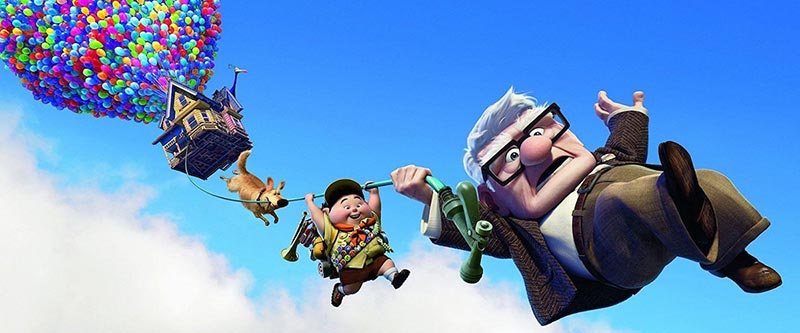At last I look at the 10th and final film nominated for a Best Picture Oscar by the esteemed Academy of Motion Picture Arts and Sciences: Up, an animated feature film from Disney’s Pixar Studios.
If there’s a single phrase which captures Up for me, its the phrase “passive-aggressive.” Let me explain. After I had watched Up, I thought to myself: “There’s something disturbing about this film.” Yet I didn’t dare share my views with anyone else who had seen the film with me because I was afraid of being called a curmudgeon, or worse, of being accused of harbouring anti-social tendencies. How could I possibly find anything wrong with the film? It’s a sweet story. The message is life-affirming. The animation is cute. The score is, uh, buoyant. It’s the sort of film that’s impossible to criticize because the minute you say anything negative, you find yourself swarmed by a roving pack of little old ladies who beat you to death with their umbrellas. And yet. And yet.

Up opens with a young Carl Fredricksen (the grown up Carl is voiced by Ed Asner) watching a black and white 1930’s Movietone Newsreel of the intrepid explorer Charles Muntz (Christopher Plummer) who has flown his dirigible, the Spirit of Adventure, to Paradise Falls, a South American land “lost in time.” Muntz has been discredited and is off again to South America to prove once and for all the existence of an elusive species of bird. After the movie, young Carl meets Ellie and the two agree that they will go on adventures together, just like Charles Muntz. In a brilliant four-minute montage, we watch the pair grow up, get married, share dreams, move into a house, discover they cannot have children, grow old together, and discover in their autumn years that they have lived their lives together without living their dreams. Ellie dies and Carl is left an elderly widower without much to account for the passage of so many years.
The montage is poignant, charming, heartfelt, and interrupted by a knock at the door. Enter Russell (Jordan Nagai), a benign but dim-witted Asian American Junior Wilderness Explorer who desperately wants his assisting-the-elderly badge. Before you know it, the house is aloft on the wings of a million helium-filled balloons and headed to South America. Like it or not, Carl is going to get his adventure after all and Russell is going to get his badge. Once they touch down, they encounter the famed Charles Muntz who proves to be less heroic (and more sinister) in real life. Like a fascist dictator, Muntz has his blackshirt army—a pack of dogs fixed with special collars that translate their doggy thoughts into English. After all these years, Muntz is still hunting for his exotic bird, which happens to have befriended Carl and Russell. It’s clear that Muntz has nefarious intentions. He will capture the bird and separate it from its young, killing Carl and Russell if necessary.
The movie concludes with Muntz dining on roast bird, Carl in a cage with bamboo shoved up his fingernails, and the pack of dogs licking its lips after picking Russell’s bones clean. Okay, I’m kidding. The ending is entirely Disney. Charles Muntz gets his comeuppance, the bird is safe and goes back to its babies, and Carl and Russell fly home in the dirigible, The Spirit of Adventure. And yet. And yet.
For all its heartwarming heartwarminess, there is something unsettling about Up. It’s chock full of assumptions that could easily be rationalized as storytelling conventions or innocuous plot devices but which, on closer examination, betray a Western colonial point of view. Consider:
- the adventure takes us to a dark and uncharted Amazonian land;
- the adventurers transport an entire house with them so they won’t have to adapt to the new land; they assume they can simply plop themselves down and continue to lead their lives unaffected by their new surroundings;
- there are no people in the new land; or to the extent that there are intelligent beings, they’re less than human;
- rather than learn anything about the indigenous (sub-human) population, and rather than deal with it on its own terms, the adventurers from America enlist it as cheap labour and force it to speak English;
- the film’s conflict is between competing Americans; the local populace has no choice but to serve interests that don’t have anything to do with them.
By making the story so sweet, it becomes unassailable. By suckering us with its sentimentality, we become complicit in the colonial assumptions that drive it. By the time we realize what’s happened, it’s too late. We’ve bought into the story; it’s become our story once again even though we tried to cast it off years ago.
After I finished watching Up, I felt dirtier than if I had watched hardcore. It’s time for new storytelling conventions and new plot devices.
